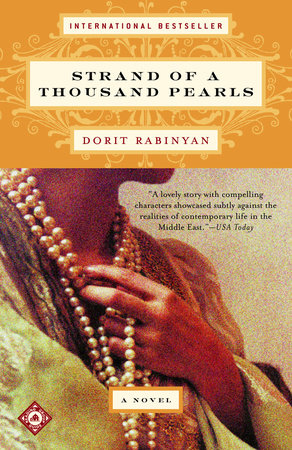Strand of a Thousand Pearls Reader’s Guide
By Dorit Rabinyan


1. Many novels appeal to sights and sounds, but Strand of a Thousand Pearls is suffused by smells — mama’s quinces and plum jams simmer on the stovetop, ripened guava perfumes the air, and sweet-scented sweat springs from the sisters’ tangled bodies. How does this emphasis on the third sense heighten your experience of the novel? Discuss the affects of aromas in creating atmosphere, heightening conflict and underscoring a sense of intimacy in the novel.
2. The Azizyan girls are tied so strongly to the bridegrooms of their dreams that little contentment is possible within their actual marriages. Evaluate the conflict between dreams and reality throughout the novel. Is it harmful to have dreams?
3. The narrator at times acts as omniscient third person, and at other times engages us in the first person, taking on the role of a seemingly unnamed Azizyan sibling. Discuss how this voice both complicates and illuminates the action of the novel.
4. Dorit Rabinyan writes about the “soundless tears of emigrants,” in which are blended both fear and regret (p.63). Discuss this theme of emigration and the importance of homeland in the novel. How are cultural traditions sustained, mingled, discarded and passed on to the new generation of Azizyans?
5. For Solly, true contentment lies in the “beauty” of life and family, while Iran grumbles that it is not beauty but “good luck” that really matters (p.148). Discuss how the parents’ individual life philosophies both hinder and help their children, and how the reliance on beauty and luck can doom the children’s self perception.
6. Iran laments “the honesty that families lose as they mature, and the gaps which appear when the individualities take shape” (p.11). Are these cleavages necessarily part of growing older? Consider whether growth and individuality are in conflict with the familial bond.
7. Discuss why Mama thinks it is important for her daughters to learn to “cook without measurements.” How is food a means of perpetuating tradition and strengthening family in the novel?
8. The insomniac Marcelle finally sleeps on the night of her bungled wedding, only to wake the next morning and discover “that her love was dead” (p.176). Describe how Marcelle’s immersion in fictional romances tricked her into a fantasy of love. What role does imagination play in desire?
9. Dorit Rabinyan has been hailed as the voice of her generation in Israel, yet her novel makes scant mention of the conflict that so dominates the news. To what extent is it a writer’s duty to confront the political situation of her time and country in her work, or is her ultimate duty to her own creativity and imagination?
Just for joining you’ll get personalized recommendations on your dashboard daily and features only for members.
Find Out More Join Now Sign In